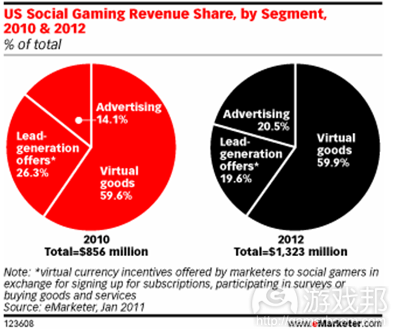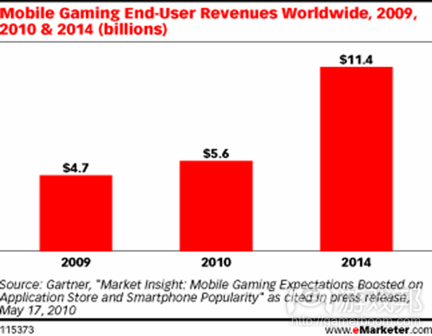五大现象预示手机社交游戏2011年发展趋势
三大具有交集性的火爆科技市场——手机、游戏和社交网络已经获得了越来越多的关注。因此,手机社交游戏将成为今年最热门的一大趋势。社交游戏的出现彻底改变了人们在线交友的方式。据eMarketer报告显示,“今年有将近6200万美国网民或者说是27%的在线用户每个月至少会玩一次社交游戏,与2010年的5300万用户相比明显增长。”社交游戏的收益来源于3大驱动力:虚拟商品,导引性销售和广告。预计这三大驱动力在今年将分别为游戏创造6.53亿美元,2.48亿美元以及1.92亿美元收益。而Gartner则预测,手机游戏市场到2014年将有可能创造出114亿的巨大收益。除此之外,MindTouch销售副总裁Mark Fidelman也曾提到:“随着手机设备的普及(特别是在一些新兴国家),开发者开始利用手机中的GPS,加速计,照相机以及方向指南功能去凸显手机平台与视频游戏掌机平台的区别。看到无数手机和便携式游戏平台用户的潜力,我们再次感受到开发这类型游戏的迫切需要。”因此,众多公司便不难预见手机,游戏和社交网络市场中的交叉利益。让我们详细分析2011年对手机社交游戏市场发展趋势具有巨大影响的五大现象。
1.Facebook Credits对游戏开发者的约束:根据TechCrunch数月前的报道,Facebook决定要求平台上所有游戏统一采纳Facebook Credits虚拟货币系统,并且这个规则在2011年7月1日正式奏效。换句话说,Facebook Credits将成为“用户唯一能够在游戏中使用的‘钞票’,而同时也允许开发者保留自己的游戏货币(如FarmBucks,FishPoints等)”。但是这种规则只适用于Canvas游戏,因此那些只是使用Facebook Connect功能的游戏并不受其影响。而这种做法对于游戏开发者有何正面影响?Facebook市场销售经理Deborah Liu曾表示,一种通用货币能够让用户更加信任游戏,不论他们是在购买Facebook Credits还是以礼物的形式接受它们,他们都可以在Facebook上的任何一款游戏中使用这种通用货币。
InformationWeek SMB也表示这么做能够“鼓励更多玩家玩游戏,并鼓励现在的游戏玩家尝试更多其它游戏。”除此之外,Playdom联合创始人Rick Thompson也曾在一次会议上也表示,Facebook很看好社交游戏领域 ,并愿意不断地在这个领域上投入资源。而这对于游戏开发者的负面影响又是什么?根据新的Facebook虚拟货币政策,只要用户使用Facebook Credits在该平台上的游戏中进行消费,Facebook便会自动从中抽成30%。这么做让那些小型开发者不得不为自己的发展捏了一把冷汗。
2.谷歌欲挺进游戏领域:根据Gamasutra在去年4月份的报道,谷歌一直在朝着与游戏相关的领域扩展,并为了达到这个目的他们还雇佣了游戏产业元老Mark DeLoura(在谷歌,他被称之为游戏部“开发大使”)。随后,在2010年7月,“谷歌向Zynga投资了1亿美元,并准备以谷歌游戏的名号开发新产品。”据报道,“当Google Ventures向ngmoco (iPhone/iPad游戏开发商)以及SCVNGR(地理定位游戏开发商)等游戏公司投资”的同时,谷歌也收购了社交游戏开发公司Slide。另外一个能够表示谷歌欲进军游戏市场的信号是,“谷歌在LinkedIn上刊登了招聘需求。”根据这个招聘内容,我们可以看出谷歌正在寻找能够“带动其全新项目,即谷歌游戏发展”的产品经理。除此之外,他们还宣称这位产品经理将负责“游戏发行,用户定位以及游戏机制的设置等任务”。如此看来,谷歌已经是摩拳擦掌准备挺进游戏市场(游戏邦注:现在的Google+ Games项目已经印证这一点)。
3.Zynga正在打造自己的网络平台:据Mashable的报道,Zynga在过去1年中收购的第14家公司便是DNA Games,后者旗下游戏包括《Casino City》,《Slot City》以及《Barworld》等Facebook游戏。《Casino City》是DNA最受欢迎的一款游戏,拥有150万月活跃用户。Flock这个发行于2005年的一款社交网页浏览器便是Zynga在2011年1月收购的另一个囊中之物。这家公司的浏览器让用户能够在浏览其它网站的同时访问他们自己的社交网站。根据VentureBeat,“Flock首席执行官Shawn Hardin表示这是一次‘完美的搭档’,Flock将帮助Zynga在任何时候,任何平台向所有人传达其最有趣的社交游戏。”根据TechCrunch,“一些大公司,如Twitter和谷歌也一直在寻找Flock公司中那种技术型人才,而如此看来Zynga也迫切需要为其游戏寻找这种帮手。”除此之外,手机游戏也是Zynga的另外一大发展目标。收购手机游戏公司Newtoy、独立游戏开发公司Floodgate Entertainment(曾经发布手机版《Civilization》以及Window Phone7游戏《Fowerz》)等迹象均表明,Zynga对手机游戏领域同样志在必得。从中我们可以看出,游戏产业中的大型公司都打算从游戏,手机和社交网络这三大热门市场的交叉点中获益。
4.EA收购手机游戏开发商Firemint:澳大利亚墨尔本手机开发工作室Firemint因开发了《Flight Control》和《Real Racing》的iPhone和iPad版本而备受瞩目。EA执行副总裁兼总经理Barry Cottle表示:“我们很欣赏Firemint所取得的成就,而他们的加入能够帮助我们更好地拓宽手机和在线游戏平台……”
此外,EA还收购了另一家手机开发商Mobile Post Production(MPP)。根据VentureBeat报道,EA的这个行动意味着他们想要“控制已经占有巨大份额的智能手机和掌机游戏市场。”
5.苹果限制应用奖励安装行为:根据TechCrunch报道,“苹果已经开始限制应用的奖励刺激下载行为。”使用这种技巧的游戏开发者通过奖励那些安装他们应用的用户而增加名气,但是当苹果开始驳回这些应用时,他们便不得不另辟蹊径了。根据Games.com报道,苹果之所以这么做是因为“热门应用排行榜中出现的异常情况,即一些存在漏洞的应用,或者一些不是很有趣的游戏突然蹿升为热门免费或付费应用。如此一比较,其它游戏(即未使用刺激性下载功能的产品)只会显得更糟糕。所以苹果认为这是一种不公平的排名竞争手段。”
游戏设计产业正在发生着巨大的变化,并且是关于手机和社交领域两者的同时蜕变。这三大领域正掀起一股人才竞争。除此之外,整个市场变得越来越拥挤,游戏规则也在不断变化,使得游戏开发者不得不面临更多挑战。所以,开发者必须时刻关注产业中的最新趋势,努力抓住任何可行机遇。
游戏邦注:原文发表于2011年5月14日,所涉事件及数据以当时为准。(本文为游戏邦/gamerboom.com编译,拒绝任何不保留版权的转载,如需转载请联系:游戏邦)
Mobile Social Gaming Trends in 2011
The intersection of three on fire markets in technology sector: mobile, gaming, and social networks is getting more and more of attention. Thus, mobile social gaming will be definitely the hottest trend this year. Social gaming drastically transformed the way people socialize with friends online. Moreover 2011 will be remembered as the year when it will become a $1 billion business. As reported by eMarketer “nearly 62 million US Internet users, or 27% of the online audience, will play at least one game on a social network monthly this year, up from 53 million in 2010”. The social gaming revenue is consisted of three driving forces: virtual goods, lead-generation offers and advertising. This year they are expected to generate $653 million, $248 million, and $192 million respectively. On the other hand, Gartner’s estimation of the total mobile gaming market by 2014 is incredible $11.4 billion, as reported by The Economic Times. Furthermore, “as mobile devices become more ubiquitous (especially in emerging countries), we’ll see developers utilize the GPS, accelerometers, camera and directional compass features to surpass the abilities of video game console platforms. We’ll also see mobile tablets and portable gaming platforms usher in millions more mobile gamers thus fueling increased demand” says Mark Fidelman, Vice President of Sales at MindTouch, the leading open source collaborative networking company. Thus, it is no surprise that companies have already foreseen the benefits of intersection between mobile, gaming, and social networks markets. Let’s take a look at some of this year’s current and predicted trends that might have impact on mobile social gaming.
1. Facebook Credits mandatory for game developers: As reported by TechCrunch 4 months ago, Facebook made Facebook Credits mandatory for Games, with the rule going into effect on July 1, 2011. In other words, Facebook Credits will be “the exclusive way for users to get their ‘real money’ into a game but developers are still allowed to keep their own in-game currencies (FarmBucks, FishPoints, etc.)”, reports TechCrunch. The rule applies to Canvas games only. Thus, games that use Facebook Connect are not affected. What’s the positive side for game developers? As Facebook marketing manager Deborah Liu noted at the Inside Social Apps InFocus 2011 conference in San Francisco, one universal currency will make users confident that when they purchase Facebook Credits or receive them as a gift, they can spend them in any game on Facebook. InformationWeek SMB reports her belief that this will “encourage more people to play games, and encourage current game players to expand the number of games they play”. Moreover, Rick Thompson, co-founder of Playdom, a social media games developer acquired by Disney in 2010, said at the conference that the decision shows Facebook is “addicted” to social media gaming and will keep investing in this area of its business, reports InformationWeek SMB. And what’s the negative side for game developers? With the new rule, Facebook automatically receives a 30% cut whenever consumers make a purchase with the currency. This has raised fears among some smaller developers about the viability of their businesses’ future, reports InformationWeek SMB.
2. Google is getting into gaming business: Last year in April, Gamasutra reported that Google continues its expansion into game-related areas and for that purpose it hired the industry veteran Mark DeLoura. He was named as “Developer Advocate” for games at Google. A bit later, in July, 2010, TechCrunch reported that “Google quietly invested $100 million in Zynga in preparation for a new product dubbed Google Games”. Next, it was reported that Google also acquired Slide, which develops social games, “while its investment arm Google Ventures backed gaming companies like ngmoco (popular iPhone/iPad game developer) and SCVNGR (location based game)”. Another indicator of Google’s real effort to enter the gaming market appeared last month when TechCrunch uncovered that a “job offer surfaced on Google’s LinkedIn profile”. According to this offer, Google was looking for a Product Manager to “grow its brand-new business – Games at Google!” reports TechCrunch. Moreover, it was stated that this person will be responsible for designing “strategies for game distribution and discovery, player identity, game mechanics, and more”. Thus, Google is serious about getting into gaming.
3. Zynga is creating its own network: Last week, Mashable reported the 14th acquisition Zynga made in 12 months. It is the DNA Games, a social game studio behind Facebook games Casino City, Slot City and Barworld. Casino City, DNA’s most popular game, has 1.5 million monthly active users, reports Mashable. Flock, a social network browser that launched in 2005, was another acquisition Zynga made in January, 2011. The company’s browser allows users to access their social networks while browsing other websites. As reported by VentureBeat, “Chief executive Shawn Hardin wrote that the deal is a ‘perfect fit’ and that Flock will help Zynga in achieving their goal of building the most fun, social games available to anyone, anytime – on any platform”. According to TechCrunch, “the engineering talent within Flock has been sought after by companies like Twitter and Google, and it appears that Zynga wants a piece of that for their games”. Furthermore, mobile social gaming is what Zynga seems to be aiming to. Acquiring Newtoy, mobile game company, or Floodgate Entertainment, which is said to be “well-versed in the mobile games space with releases like a mobile adaptation of Civilization and Flowerz, a Windows Phone 7 game, under its belt”, indicates Zynga’s efforts to get more into mobile gaming. This again brings us to the point that some of the biggest players in gaming business are already trying to capitalize on intersection of the three hottest markets: gaming, mobile, and social networks.
4. Electronic Arts (EA) acquired Flight Control creator Firemint: In the beginning of this month, Electronic Arts (EA), an American developer and publisher of computer and video games, acquired Firemint, a privately held mobile development studio based in Melbourne, Australia. It is mostly recognized as the developer of Flight Control and Real Racing for iPhone and iPad. Barry Cottle, Executive Vice President and General Manger of EA Interactive said: “The Firemint team is remarkable for its critical and commercial success. Having them as part of EAi will accelerate our position as worldwide leader in game development for mobile devices and online gaming platforms.” Recently, EA also purchased Mobile Post Production (MPP), another mobile developer. These moves show EA intentions “to dominate the market for mobile games on smartphones and tablets, where it already has a big presence”, reports VentureBeat.
5. Apple: Free currency in social games is out: In April this year, TechCrunch reported that “Apple is clamping down on incentivized downloads”, thus it became much harder to buy yourself popularity on the AppStore. Game developers that used this technique, rewarding users if they install another app, to gain popularity need to find another strategy since Apple started to reject such apps, reports TechCrunch. The reason for this is “the weird imbalance on Apple’s top app charts, as apps that may suffer from bugs, or simply aren’t that enjoyable suddenly rise to the top of the free or paid app charts. This “padding” makes other games (those that don’t use this incentive-based download feature) look worse by comparison, which Apple claims simply isn’t fair” reports Games.com.
The gaming design is definitely changing. It is not about being mobile or social only, but it is about being both. Competition is buying talent from all three fields. Moreover, as the battlefield gets crowded, the rules of the game change, imposing greater challenges on game developers’ side. Thus, watch out the latest trends in the industry, learn quickly, learn often and grab the opportunity.(source:seeqnce)
上一篇:逆向思维:什么不属于声音设计?









































 闽公网安备35020302001549号
闽公网安备35020302001549号